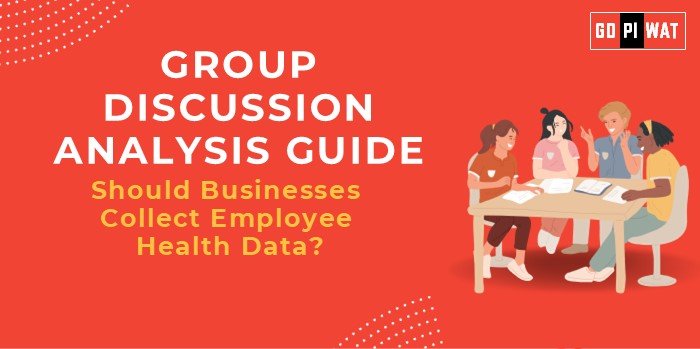📋 Group Discussion (GD) Analysis Guide
🌐 Topic: Should Businesses Collect Employee Health Data?
🌟 Introduction to the Topic
Opening Context: The increasing integration of data-driven decision-making in organizations raises ethical and operational questions about collecting employee health data to enhance productivity.
Topic Background: Businesses argue that monitoring health data (e.g., fitness levels, stress metrics) can reduce absenteeism, improve workplace well-being, and optimize performance. However, this also raises privacy concerns, ethical dilemmas, and legal challenges, particularly with global data protection frameworks like GDPR and HIPAA.
📊 Quick Facts and Key Statistics
- Global Wellness Industry: Valued at $4.4 trillion in 2022, highlighting companies’ focus on employee health initiatives.
- Productivity Loss: Companies lose $1,685 per employee annually due to health-related absenteeism (U.S. Bureau of Labor Statistics).
- Data Breaches: Health-related data breaches surged by 35% globally in 2023, emphasizing risks associated with health data.
- Wellness Programs: About 50% of U.S. firms collect some form of health data through wellness apps.
- Employee Trust: Only 25% of employees feel comfortable sharing health data with employers (PwC, 2023).
👥 Stakeholders and Their Roles
- Employers: Advocate for collecting data to promote health initiatives and improve efficiency.
- Employees: Key stakeholders who face privacy risks but may benefit from health programs.
- Governments: Regulators enforcing privacy laws (e.g., GDPR, HIPAA).
- Technology Providers: Develop tools like wearables and health apps for data collection.
- Employee Unions: Safeguard employee rights and prevent exploitation of data.
🏆 Achievements and Challenges
Achievements
- Improved Productivity: Healthier employees are 3 times more productive (WHO).
- Reduced Healthcare Costs: Companies save up to 25% on health costs by implementing wellness programs.
- Predictive Analytics: Identifying early signs of stress or illness prevents burnout.
Challenges
- Privacy Concerns: Misuse of sensitive data could breach employee trust.
- Data Security Risks: Rising cyberattacks pose risks for health data leaks.
- Ethical Boundaries: Collecting health data may infringe on personal autonomy.
🌍 Global Comparisons
- U.S.A: Companies under HIPAA ensure robust data protection frameworks for health data.
- Europe: GDPR enforces strict laws on employee health data collection and consent.
📖 Case Study
Microsoft’s Wellness Program: Implemented anonymous health surveys to balance privacy with productivity.
🗣️ Structured Arguments for Discussion
- Supporting Stance: “Collecting employee health data fosters targeted well-being programs, reducing stress and increasing productivity.”
- Opposing Stance: “Employee health data collection undermines privacy and risks misuse, eroding trust in workplaces.”
- Balanced Perspective: “While employee health data can improve workplace efficiency, businesses must ensure transparency, consent, and strict data protections.”
🎯 Effective Discussion Approaches
- Opening Approaches:
- Data Impact: “Companies lose over $1,600 per employee annually due to health-related absenteeism, highlighting the need for better wellness tracking.”
- Ethical Contrast: “Balancing employee productivity with personal privacy remains the key challenge in collecting health data.”
- Counter-Argument Handling:
- Privacy Concern: “Health data should be anonymized, encrypted, and used only with employee consent.”
- Trust Issues: “Transparency in how data is collected, stored, and used builds employee confidence.”
📈 Strategic Analysis of Strengths and Weaknesses
- Strengths: Improved productivity, reduced costs, targeted wellness initiatives.
- Weaknesses: Privacy risks, ethical dilemmas, legal compliance issues.
- Opportunities: Develop transparent wellness programs with anonymized data.
- Threats: Data breaches, misuse of health information, employee backlash.
🌟 Connecting with B-School Applications
- Real-World Applications:
- Analyzing how firms like Google and Amazon implement employee wellness strategies.
- Developing ethical data frameworks in HR for workplace management.
- Sample Interview Questions:
- “How can companies balance health data collection and employee privacy?”
- “What role do regulatory frameworks play in managing health data collection?”
- Insights for Students: Health data collection presents opportunities in HR analytics, data security management, and ethical leadership.


